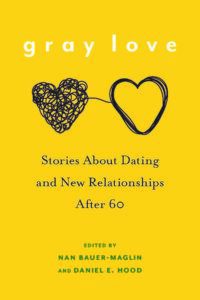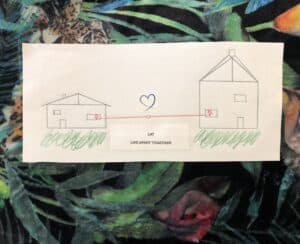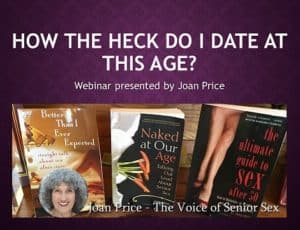Posts Tagged ‘seniors dating’
Gray Love: Stories About Dating and New Relationships After 60
Gray Love:
Stories About Dating and New Relationships After 60
ed. Nan Bauer-Maglin and Daniel E. Hood
Reviewed by Mac Marshall
“We are stunned sometimes when we realize how old we are. Eighty-one and eighty-eight! How I wish we had decades left, but we’re both aware that one of us could drop like a leaf at any moment no matter how healthy we are right now. And we’re also aware that this relationship could not have worked if we were younger.” — Barbara Abercrombie in “Where Is This Going?”
In lively personal accounts, 45 contributors to Gray Love explore the ups and downs of their searches for new relationships late in life. These authors range in age from 59 to 94. Most have experienced divorce or widowhood. Their stories underscore our strong human longings for connection, sexual pleasure, and abatement of loneliness as we grow older. Gray Love offers both cautionary tales and reasons for hope.

Nan Bauer-Maglin
“Meeting someone informally through family, church, or neighborhood networks has been in decline since World War II,” editors Nan Bauer-Maglin and Daniel E. Hood note in their Introduction. Now, meeting new people online has displaced all other ways to locate potential dates.
The first half of Gray Love (“To Be or Not to Be in a Relationship”) focuses on a variety of seniors’ often disheartening experiences with online dating sites. And yet, in “You Say Potato,” Amy Rogers comments, “Without an ability to imagine some sort of future happiness, we’d have no reason to put ourselves through these hapless and sometimes heart-breaking endeavors.”

Daniel E. Hood
While they understand that this is the best current way to find dates and possible partners, 22 single seniors chronicle a litany of being frustrated, ignored or rejected online. Several have engaged in online dating for a decade or more. For example, Elizabeth Locke laments in “A (Mostly) Amusing Exercise in Futility”:
“Fifteen years of throwing money I can’t spare at websites whose only real purpose is to fill their coffers was frequently a waste of my time. But it wasn’t a total loss; I had some truly delightful evenings and way too many mediocre meals… I crossed paths with men I would not have otherwise met. I formed attachments that teetered on the edge of love, experienced at least one heartbreak, and made a few friends… I learned to cope with an almost unimaginable dose of rejection.”

Phyllis Carito
These seniors aren’t fully happy or at ease with the quasi-businesslike procedures of meeting people online. In“Discovery Through Online Dating Sites: A Woman’s Perspective,” Phyllis Carito writes, “The process can be daunting or fun; it can reveal the deep sadness of a widower or the hidden desires of a man that can be a surprise to him depending upon past experiences molded by a traditional marriage.”
Several contributors have gone in and out of online dating or tried several different sites. All had meetings with other seekers, most had some sexual encounters, some developed temporary relationships, but few found “the one” that many of them seek.
But some have done so! The second half of Gray Love (“The Complications and Pleasures of Elder Relationships”) delves into cases where widowed or divorced seniors did find a new life partner. Usually, this happened via the online dating sweepstakes. Most partners have chosen not to marry. Instead, they simply

Dustin Beall Smith
revel in the joys of a loving, caring, intimate relationship, whether cohabiting or not.
“That night, all night, we lay on my king-size loft bed, with its view of the river, our seventy-four-year-old bodies smoothed magically young again by the forgiving light of yet another full strawberry moon.” — Dustin Beall Smith, in “At Once”
Several couples have chosen to live apart together (LAT), an ever-more-popular arrangement among seniors that combines independence with committed togetherness. Writing in “Pleasures and Complications: Living Apart Together,” widowed, 80-year-old Susan Bickley met her 7-year-younger partner, Mike (also widowed) on Match, and they clicked. He had a big old house. She had a recently purchased condo and wasn’t keen to share it. Luckily, another condo in the same building became available. Mike bought it and sold his house. Now, in Susan’s words, “We are finding joy in small things… knowing that we are here for each other, even when we are apart—and down the hall.”
Gray Love chronicles a search for connections, sexual and otherwise, in life’s final chapters. Most contributors live in or near New York City and have backgrounds in education. These characteristics lend their tales a certain flavor. Most stories were written amidst the COVID pandemic, and the shadow of that still-with-us event hovers over their searches for dates and relationships. As a reader, you will learn much about the road ahead by engaging with these seniors as they share honestly some of their life experiences.

Order Gray Love from Rutgers University Press or Amazon.

Mac Marshall
Mac Marshall, PhD is a retired anthropology professor, researcher, and author who is delighted to explore sexuality studies at this time of his life.
Saying “No” with Class: Rejections I’ve Liked
1/16/2023 update: One of my ongoing tasks is culling my 17+ years (!) of blog posts. Working backwards from 2005, I’m working on deleting those that are outdated, no longer interesting or useful, reviews of sex toys that no longer exist or from companies I no longer endorse, and so on.
Occasionally, though, I hit upon a topic that is as relevant now as when I wrote it, such as this one from 2011. If you’ve been rejected by a date or potential date — or done the rejecting — in a way that’s kind and respectful, please share in the comments.
Originally published January 2011:
My dabbling in online dating continues to be interesting, often funny, sometimes frustrating when the dating sites seem to ignore my criteria when announcing with great fanfare that they’ve found a match for me.
I’m going into this to expand my social life and meet good men who might become friends, or provide an hour of interesting conversation, or stimulate me to pursue a deeper relationship — or just remind me why I enjoy my single life. I’m not earnestly seeking a soul mate or looking to get married. This gives me the advantage of being able to take this whole process lightly, and my day is not ruined by a rejection or by the paucity of applause-inducing matches.
Sometimes I read a profile that leaves me saying, “Wow! I’d like to know this person!” and I send an e-note expressing why his profile interested me. Occasionally my interest is returned, but that’s rare (I’m not sure why). Usually I’m ignored. I really like it, though, when the recipient of my interest sends me a polite “No, thank you.”
To encourage you to do this, here are some of the nice ways I’ve been turned down:
- Thanks for the note and kind comments. My age range is general, like any sensible man would say, but it can be a factor. Equally, if not more, important, is the geographic range. While I know that your city is not on the other side of the moon [comment from Joan: we live about 40 mi. apart], it is too far for me at this point of this odd online dating process. I have tried the long distance relationship a few times, and each time, it proved too much the struggle. So, thanks for reaching out, and I wish you the best.
-
I am so honored that you would send me an email. You look and sound like a delightful woman, and I enjoyed reading your profile. However, as flattered as I am by your contact, it’s my strong hunch that we’re really not a match. So, let me send you my best wishes for meeting your match.
- Actually, I am looking for a soul-mate. Dating and friendship is fine, but I would like to “go all the way” as it were. About four years ago, I dated a woman who had lost her husband and I thought we were a pretty good fit, but she loved her husband very much and had no room for me. You seem like a smart and interesting person, and I could be making a mistake, but somehow I feel that we aren’t a good fit either. You may be right in looking for a widower. Thanks for writing me.
- Thank you for the contact and the nice words. I am in a process of transition, learning to listen to myself and find out what I am looking for at this juncture in my life. You seem like a beautiful and interesting person. However at this point I don’t feel that we would be a good match for dating. I send my heartfelt wishes to you to find the person and love that you seek and deserve.
Readers: Have you received “no, thank you” notes that made you smile instead of cringe? Have you sent any you’d like to share? Please comment.
How Do You End A Relationship?
I wrote this post 6 years ago, in 2016. I’d like to submit this question again, hoping to ignite a discussion. Please post your comments, and include your age. Thanks!
If you’re dating (or trying to date), I’d like your input:
Let’s say you met someone, either through online dating or some other way. It seemed to have potential as you started to spend time together and get to know each other, but soon you realized it wasn’t going to work out.
Which of these do you do?
- Say something like “I’m sorry, but I don’t see us as a match,” with a kind explanation.
- Say something like “I’m sorry, but I don’t see us as a match,” but with no explanation.
- Give an explanation that you know will hurt, but will definitely end things.
- Give the true reason you want to end it.
- Make up an excuse, e.g. decided to get back with an ex, or not ready to date again, or …?
- “Ghost” or “fade away”: you say nothing but don’t get in touch or respond when the other person contacts you.
- Other? (Please explain.)
Now switch roles:
If you’ve been on the receiving end of any of the above, which one(s) left you feeling okay? Awful? If rejection has to happen, how do you want to be rejected?
Do your answers change in any way if you and this new person have been sexual?
Please comment, and although you don’t need to give your real name (please choose something other than “Anonymous”), please include your real age. I’d like to contrast the views of our over-50, -60, -70 age group with those younger.
I look forward to your comments!
2022 update:
Do you need some help navigating the dating scene as a senior? View my webinar, “How the Heck Do I Date at This Age?”
I’m also happy to bring this interactive workshop to your group as a live virtual presentation. Contact me!
LAT (Living Apart Together) for Seniors By Mac Marshall
Many of us over 60 are widowed, divorced, or maybe single our whole lives. We’ve gotten used to being independent. We’ve created a life for ourselves, with our own routines, habits, activities, and friends. We’re happy living on our own.
Then we meet someone — and ka boom!
Hearts aflutter, sex drive in high gear, intimacy is ours. We fall in love. Our closeness grows. We feel a strong commitment to each other. Our next step must be…
No, no, no! We don’t want to get married. We don’t even want to live together.
We relish our visits — especially the overnight ones! — and we equally relish the return to our own home afterwards. For many of us, the idea of marriage or even cohabitation may be unattractive, undesirable, or unworkable. Because of our personalities or our circumstances, we don’t want to mingle homes, finances, and legal obligations. Fortunately, there’s a lifestyle choice and relationship modality that describes what we want, and many of us are living that way now.
LAT is shorthand for “living apart together.” LAT is a long-term, committed, romantic connection without an intent to share a home.
LAT presents an attractive long-term relationship alternative to traditional marriage. It is a lifestyle choice—a new emergent family form, especially among older adults.
In a LAT relationship, a couple who’ve developed strong, loving feelings for one another nevertheless choose to reside separately. Usually, they get together on a regular basis, but each retains a separate abode. People in a LAT relationship treasure their times together, and they equally value their autonomy and alone time. LAT offers the separation that complements our need for togetherness. For many, it provides the best of both worlds.
Why might you, as seniors, prefer a LAT relationship over marriage or living together?
- You each maintain your own home and private space.
- You each retain and interact with your own friends and social network.
- You each keep control over your own finances.
- You each pursue activities and hobbies which may not interest the other partner.
- You rely on each other for emotional intimacy and support without being together all the time.
- You celebrate your personal autonomy concurrent with the joy of regular close companionship.
- By not cohabiting 24/7, the time you spend together is ever sweeter.

Does LAT appeal to you? Do you live that way now? Any tips for readers who are considering LAT? We welcome your comments, experiences, and questions.






